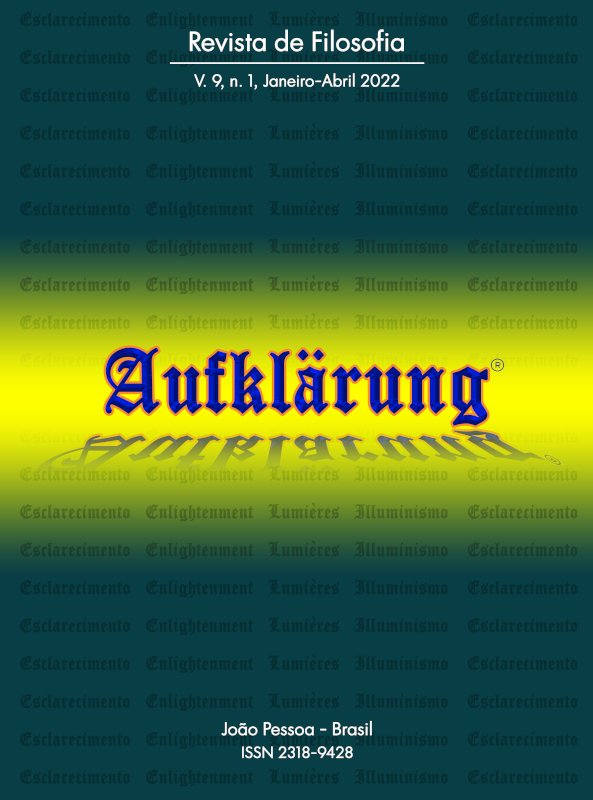The problem of the subject in Russian ideal-realism
DOI:
https://doi.org/10.18012/arf.v9i1.61495Palavras-chave:
personalidade, filosofía religiosa, estratégias cognitivas, Filosofía europeia, culturaResumo
This study aims to solve the issue of subject and object in onto-gnoseological knowledge. The subject is revealed considering its inexhaustibility in the cognitive process. This concept correlates with such important features of Russian philosophical thought as pondering on the essence of personality, the status of truth, and its place in discourses on the cognitive process. The research methodology includes such methods as analysis and synthesis, comparative analysis, which allows making valid interpretations of the foundations of the existing reality. An important method in the article is the historical-genetic approach. The article shows the transition in discourse from the issue of the subject to the topic of personality, which is an ontological concept and brings thought to the scope of freedom in the philosophical knowledge of the world. The paper demonstrates how Russian philosophy becomes ideal-realism, which combines the most important concepts of philosophical thought. This research can be used in further study of Russian philosophy. The analytics of such concepts as intuition, organic outlook, and discursive thought is presented, and the issue of personal expression of cognitive practices is raised, which expands the boundaries of the concept of the subject and makes a connection between epistemology and ontology. It shows how ideal-realism becomes the leading philosophical direction of its time, and its possibilities on the way to knowledge of the truth are also revealed.
Downloads
Referências
ASTAPOV, S.N. ‘The contradictory unity of faith and reason in Christian theoretical thought HTS Teologiese Studies’, Theological Studies, vol. 75, n. 4, pp. a5273, 2019.
BODEA, R.-O. ‘Nikolai Berdyaev's Dialectics of Freedom: In Search for Spiritual Freedom’, Open Theology, vol. 5, n. 1, pp. 299-308, 2019.
FRANK, S.L. Writings. Moscow: Pravda, 1990.
FRANK, S.L. The subject of knowledge. Human soul. Moscow: AST, 2000.
GAISIN, A. ‘Solovyov’s metaphysics between gnosis and theurgy’, Religions, vol. 9, n. 11, pp. 354, 2018.
GOLOVANOVA, N.F. ‘Anthropological inconsistencies in educational characteristics: Comparative approach’, Perspektivy Nauki I Obrazovania, vol. 36, n. 6, pp. 10-17, 2018.
HEGEL, G.W.F. The phenomenology of spirit. Saint-Petersburg: Science, 1992.
HEIDEGGER, M. Being and Time. Moscow: Republic, 1993.
HEIDEGGER, M. Being and Time. Kharkiv: Folio, 2003.
HUGHES, R.A. ‘Nikolai Berdyaev’s Apophaticism’, St Vladimir’s Theological Quarterly, vol. 58, n. 2, pp. 441-455, 2014.
HUSSERL, E. The logical Investigations. Moscow: AST, 2000.
ILYIN, I.A. Axioms of Religious Experience. Moscow: AST, 2002.
INISHEV, I. ‘Heidegger and Russian philosophizing: The productivity of the distance Horizon’, Studies in Phenomenology, vol. 7, n. 2, pp. 546-553, 2018.
KANT, I. Critique of Pure Reason. Moscow: Thought, 1994.
KANT, I. Critique of the Power of Judgment. Moscow: Art, 1994.
KIEJZIK, L. ‘The beginnings of Berdyaev's critical marxism (in light of his unpublished correspondence with Kautsky)’, Bulletin of Saint Petersbutg University, Philosophy and Conflictology, vol. 34, n. 2, pp. 177-185, 2018.
LOSSKY, N.O. Selected Writings. Moscow: Pravda, 1991.
MALININ, S.A. ‘I.A. Ilyin as a philosopher and essayist’, Young scientist, vol. 15, pp. 417-419, 2014.
MALINOV, A.V. ‘Discourse of nature in Gregory Skovoroda's teaching’, Rivista di Estetica, vol. 67, n. 1, pp. 33-48, 2018.
MALINOV, A.V. ‘Vladimir Lamansky in Saint Petersburg University’, Bulletin of Saint Petersbutg University, History, vol. 64, n. 1, pp. 211-221, 2019.
OBORSKY, A.Y. ‘The national mentality in the history of philosophy’, XLinguae, vol. 11, n. 3, pp. 158-165, 2018.
PETKANIČ, M. ‘The concept of personality in the work of Russian philosopher Nikolai Alexandrovich Berdyaev (Climax of the personalistic line of Slavic thought)’, Konstantinove Listy, vol. 11, n. 1, pp. 130-137, 2018.
POLIPCHUK, D.S. ‘Some features of I. Ilyin’s philosophy of religion’, Bulletin of the Tambov State University. Series: Humanities, vol. 4, n. 132, pp. 15-21, 2014.
POLTORATSKY, N.P. Russian religious and philosophical thought of the XX century. Pittsburgh, 1975.
PYLAEV, M. ‘Prolegomena to any future religious studies that may appear as Christian religious studies’, Bulletin of Orthodox Sviato-Tikhonovsky Human Studies University, Series I: Theology, Philosophy, Religion Studies, vol. 80, pp. 119-126, 2018.
RICOEUR, P. History and Truth. Saint Petersburg: Aleteya, 2002.
ROJEK, P. ‘God and Cogito: Semyon Frank on the ontological argument’, Studies in East European Thought, vol. 71, n. 2, pp. 119-140, 2019.
SARTRE, J.-P. Being and Nothingness. Moscow: Republic, 2002.
SHAKHNOVICH, M.M. ‘The Discussion on Stoicism in Russian Thought of the second half of the 19th –early 20th century and the History of the Study of Christianity’, Bylye Gody, vol. 53, n. 3, pp. 1125-1133, 2019.
SOLOVIEV, V.S. Works in 2 volumes. Moscow: Mysl, 1988.
TENACE, M. ‘The Cultural and Ecclesial Implications of the Debate according to Vladimir Solovyov’, Obnovljeni život, vol. 74, n. 2, pp. 153-160, 2019.
ZENKOVSKY, V.V. History of Russian Philosophy. Moscow: EKSMO-Press, 2001.
Arquivos adicionais
Publicado
Como Citar
Edição
Seção
Licença

Este trabalho está licenciado sob uma licença Creative Commons Attribution 4.0 International License.
Política de Direito Autoral para os itens publicados pela Revista:
1.Esta revista é regida por uma Licença da Creative Commons aplicada a revistas eletrônicas. Esta licença pode ser lida no link a seguir: Creative Commons Attribution 4.0 International (CC BY 4.0).
2.Consonante a essa politica, a revista declara que os autores são os detentores do copyright de seus artigos sem restrição, e podem depositar o pós-print de seus artigos em qualquer repositório ou site.
Política de Direito de Uso dos Metadados para informações contidas nos itens do repositório
1. Qualquer pessoa e/ou empresa pode acessar os metadados dos itens publicados gratuitamente e a qulquer tempo.
2.Os metadados podem ser usados sem licença prévia em qualquer meio, mesmo comercialmente, desde que seja oferecido um link para o OAI Identifier ou para o artigo que ele desceve, sob os termos da licença CC BY aplicada à revista.
Os autores que têm seus trabalhos publicados concordam que com todas as declarações e normas da Revista e assumem inteira responsabilidade pelas informações prestadas e ideias veiculadas em seus artigos, em conformidade com a Política de Boas Práticas da Revista.






































